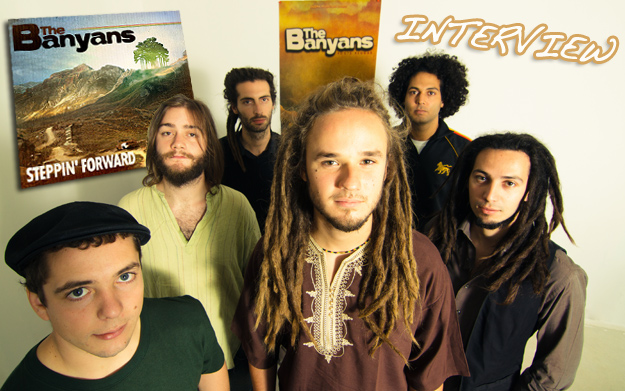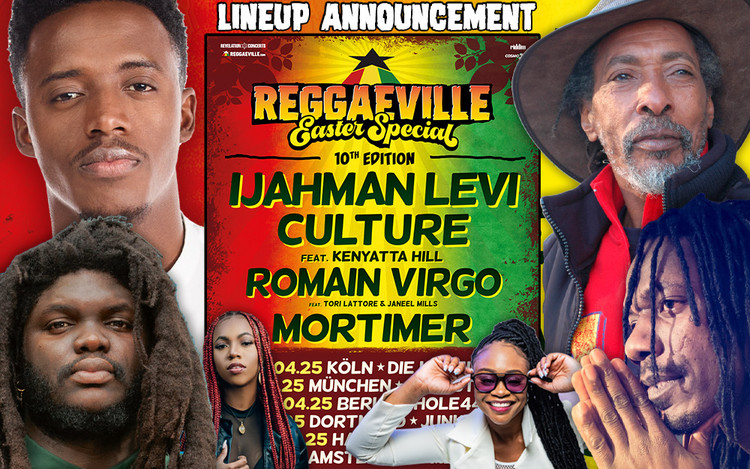The Banyans ADD
Interview: The Banyans Are Steppin' Forward
06/08/2013 by Valentin Zill

With their album debut Steppin‘ Forward, The Banyans, a young band from Toulouse, France, have staggered fans and critis alike. Their sound is closely modeled on classical 1970s roots reggae. The album [read the review here] was recorded the old-fashioned analog way. REGGAEVILLE talked to Devi, the lead vocalist and guitar player of the band, and their lead guitar player and manager Jay.
How did you get into reggae music?
Devi: For a long time, the hole band has been passionate about roots reggae from the 70s. Personally, my parents played reggae music when I was young. My father played in a reggae band called Revelation Time in Amsterdam, the city where I was born. I grew up in the reggae movement and I was interested in the Rasta culture and its message. It is similar with the other musicians, but in a different way. We all grew up in this conscious kind of music discovering bans such as Gladiators, Israel Vibration, The Wailers, Yabby You, and Jacob Miller.
How did you meet?
Jay: I met Devi at a music club, the Lyceum, and then we decided to create a more serious project together. So in 2007, we formed The Banyans with Natty, the bassist. After three years of experience and meetings we took a different approach, more professional, with the arrival of Sticky (drums), Mael (keyboards, organ) and Jean (keyboards, backing vocals).
What does your name mean?
Devi: The Banyan tree is a tree from the species of Ficus. It is a kind of giant fig tree that grows mainly in India and in tropical areas. There are several symbols around this tree. Firstly, it is a "roots tree", which has aerial roots that connect branches to the ground. This symbolizes to us that our roots are as much in the ground as they are in the sky: I & I. Its roots spread continuously and can even destroy some human constructions. This tree represents a spiritual and a social symbol. Indeed, in the towns and villages of India, it is under this tree, with large leaves, that the Sadhus share their teachings and meditations. The elders give advice and children gather to play under it.
It also has many therapeutic properties. In other words, it is a tree with many mystical meanings.
Do you have a professional background in musics?
Devi: The drummer and the two keyboards players have a musical degree in jazz and actual music. They also have experiences with other bands and other genres of music. The rest of the band learned to play music by listening to it and practicing at home. However, we all took classes for our own instrument. Nowadays, Mael, Jay and Sticky give music classes to young people to teach the instrument they play themselves and I worked with children and did some musical projects with them.
At what point did you decide to go professional with your music?
Jay: In 2010, when we met the three last musicians, Sticky, Mael, and Jean. We spent a lot of time rehearsing, trying to find our music, our sound, our identity. In the meantime we decided to buy a minivan and to record an auto-produced demo CD, called Back to The Roots, so that we could play some live music throughout France. We did lots of gigs in France and in bordering countries as well as opening shows of famous artists, including U-Roy, The Wailers, Groundation, Israel Vibration, Ky-Many Marley, Clinton Fearon, Anthony B, Johnny Clarke, Horace Andy, and many more.
The road for auto produced bands is long in France. Were there people who lent you a helping hand?
Jay: Yes of course, the road is really long to be able to auto produce oneself. As of now, we never got any subsidies from the government or other financial aids. But we received a lot of help from many fans or family who have supported us from the beginning. The first to come to our mind is our graphic designer Yohan Aja, who works hard and a lot for us. Secondly, we have some great fans that support us over the internet and make a lot of promotion for our band. And finally, we did some good gigs and opening acts of the great artists we mentioned above thanks to Talowa Productions, a reggae booking agency of which we are part of since 2011. We take this opportunity to thank all of them.
Which foundation artists influenced you the most?
Jay: All the Jamaican artists from the 60s until the 80s. In particular Israel Vibration, Bob Marley & The Wailers, Burning Spear, The Gladiators, Yabby You, Jacob Miller, Lloyd Charmers, Gregory Isaacs, Clinton Fearon, Culture, Delroy Williams, Horace Andy, Alton Ellis, Ken Boothe, Johnny Clarke, and the list is very long you know! We are also influenced by English artists such as Steel Pulse, Linton Kwesi Johnson, Black Roots, Aswad, or more modern ones like the US band Groundation. Likewise, we listen to soul and the black music from the roots, like Otis Redding, Sam Cooke, Al Green.
How do you write your songs?
Devi: I write all the lyrics. To create the composition, I often come up with the chords and the lyrics and the musicians do their own parts. But of course one of the musician could bring a personal composition too and we would work on it together in rehearsal. It’s also possible that we create a song while improvising because we start every rehearsal with some improvisation. What is sure, is that each musician has his own and personal color in music. That makes up The Banyans’ sound.
Where and with whom did you record Steppin' Forward?
Jay: We recorded the entire session at Le Studio de la Trappe near our rehearsal place in Toulouse. It is a vintage studio with an analog system. This studio records on tape and uses preamp tubes and ribbon mics! We were right back in the 70s. After that, we did the mixing with our own sound engineer HP at his studio. The mastering was done in Bordeaux, France at Globe Audio Studio, a famous place for mastering.
Didier Bolay and Guillaume Briard are featured as guest musicians. How did you get in touch with them?
Devi: We met Stepper (Guillaume Briard) first as the opening act of Omar Perry, because he works with the Homegrown Band, the backing band of Omar Perry. It was in January 2012. After our show, we spoke with him about the recording that we had to start the next month, and we just asked him if he wanted to play the horn section on our album. Since he appreciated our show, he accepted. So we were in Paris and Stepper proposed to Didier Bolay, a good friend of him, to participate. It was a really good session at the Fabwise Studio. And today we keep in touch with both.
How would you sum up the message you want to pass on to the public with Steppin' Forward?
Devi: The message is spiritual. It talks about the balance between our physical body and our spiritual mind. This balance is what we call I & I. I talk about this in Let Grow and Solid As A Rock, for example. There is also a message that calls for gathering, for unity, because reggae is the music of the people. This is the great strength of this music, it unites thousands of people that face a system of oppression and division. All the texts speak about everything that we see around us, but also what happens inside of us. Most texts such as International Disorder, Nah Run or Big Rock, denounce this handful of people that dominate and crush others. But there are also more personal lyrics, such as Same Love or another song that speaks about the loss of a beloved person with the title Free Your Soul, where I speak directly to my brother who lost a close friend. To finish with the group's message, we have chosen to conclude the album with a song called Dreamer, a song full of hopes for our future. Our album summarizes our way of thinking. It's an invitation to see how simple life is when we focus ourselves on the real things, the positive things. That's why we've got to steppin‘, steppin‘, steppin‘ forward.
What about your touring schedule for this summer?
Jay: We toured in April throughout France to promote Steppin‘ Forward. This summer we will start in France in June until the end of July, then we will go to Italy until the 15th of August and we will be in Poland at the end of August. But this tour is not fully booked yet, so if you want to see us in your town, contact Talowa Productions, our booking agency (laughs).









